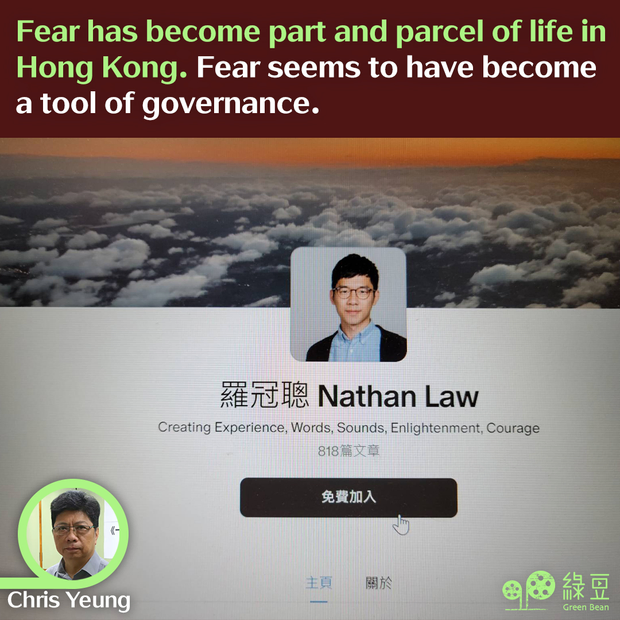Wanted: freedom from fear

It was not until the 1990s that the concept of freedom from fear had caused disquiet in some quarters of the Hong Kong society following the publication of a book by Myanmar’s democracy crusader Aung San Suu Kyi under the same title.
But for many years even after the resumption of Hong Kong’s sovereignty by the communist regime, the concept remained remote and irrelevant in the former British colony known for its freewheeling lifestyles and right of free expression. Few have associated Hong Kong with the junta-ruled Myanmar.
26 years after the handover, Hong Kong remains vastly different from Myanmar. But the concept of freedom from fear has become increasingly relevant in the city’s socio-political scene.
Agnes Chow, a young pro-democracy leader who recently jumped bail and is now in Canada, said Hong Kong “is full of fear.” She said in an interview she understood better now what “freedom from fear” meant.
Chow was being put under intense scrutiny by the Police’s national security officers after she was granted bail as investigation for her alleged collusion with foreign forces was presumably underway. She said after she left Hong Kong she suffered frequent panic attacks and could do nothing for more than three years.
Chow is not the only one, but perhaps one of the most frightening cases of Hong Kong people who have lived in fear after the 2019 political turmoil in the past few years.
Like Chow, many people have had a deeper understanding of “freedom from fear” in the wake of the drastic changes since the national security law took effect in mid-2020.
It was no longer remote, but was nearing; it was by no means irrelevant, but damningly real in daily life. Fear has become part and parcel of life in Hong Kong. Fear seems to have become a tool of governance.
The past week saw plenty of cases showing the fear factor has impacted life in the city.
On December 10, the 170,000-strong civil servants were the target of the strongest-ever appeal by top officials and their department heads for them to cast a vote in the 2023 District Council election. Speculation was rife that they were given “strong advice” to cast a vote.
It is difficult to ascertain the number of civil servants who have come out to vote as those details are supposedly confidential.
But the record 22,000-strong invalid votes in the election could shed some light on the phenomena of “reluctant voters” in the December 10 election. Fearful of the potential danger of not casting a vote, some may have cast an invalid vote as a form of protest.
Another wave of fear hit the fleet of civil servants as the Civil Service Bureau issued a draft Civil Service Code for consultation. It states civil servants “cannot criticise” government policies or “support opposing views of any other party in their official capacity, either offline or online.”
“How civil servants conduct themselves on the internet is no different from how they conduct themselves in the real world,” the code wrote, adding that their conduct could “simply go viral.”
The code stoked fears that the room for civil servants to express their views in their capacity as citizens and on private occasions will be drastically narrowed. To avoid crossing over the political “red lines”, many may choose to shut up.
Another case in point featured the arrest of four people by the Police’s national security team on Wednesday over links to Nathan Law and Ted Hui, who were among eight wanted people announced in July.
The four were said to have provided financial assistance to Law and Hui via an online subscription platform, which is widely reported to be Patreon, between December 2020 and November 2023.
Police has declined to say specifically whether mere subscription to those online platforms could constitute a breach of the ban on providing financial assistance to those who organised activities seeking to endanger national security.
The arrest of the four looks set to cause more jitters among people who have joined online subscription platforms, fearing that they may be arrested for simply paying for online contents.
National security officers said explicitly people should consider dropping their subscription if they feel unsure about whether the relevant platform could pose a danger to national security.
The ambivalent remarks by officials on the risk of subscription of online platforms will put more psychological pressure on people in Hong Kong who have paid for the online information service. The fear factor may take its toll on online subscription platforms with some may start distancing from the platforms.
A city engulfed by fear cannot possibly be a happy city with peace and stability.
▌[At Large] About the Author
Chris Yeung is a veteran journalist, a founder and chief writer of the now-disbanded CitizenNews; he now runs a daily news commentary channel on Youtube. He had formerly worked with the South China Morning Post and the Hong Kong Economic Journal.